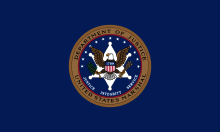The U.S. Marshals Service (USMS) has been around for over 230 years, created by the first Congress to protect/serve the federal courts and make sure the orders of the President, Congress, and Judges were carried out across the United States. It is the country’s oldest federal law enforcement agency.
I never thought of US Marshals as census takers, but up until 1870 they did that in addition to arresting fugitives and serving subpoenas. Over the years they have also been asked by Congress and the President to capture fugitive slaves, swap spies with the Soviet Union, chase the bad guys, control riots – the basic idea being to help the government run more smoothly when nobody else has been quite qualified to do the job across State lines.
An interesting aspect of their history is that at first, US Marshals answered to the Secretary of State. In 1861, they fell under the Attorney General’s office and then in 1961, became an entity of their own with a Chief Marshal in charge. It has always been the enforcement arm of the federal courts and operates within the Department of Justice.
The 94 US Marshals are appointed by the President and handle the enforcement duties for the 94 federal court districts and the 12 circuits of the US Court of Appeals. They employ over 5,200 deputy Marshals, criminal investigators, administrative employees, and detention enforcement officers. They are in charge of:
- Judicial Security
- Fugitive Operations
- Asset Forfeiture
- Prisoner Transportation
- Witness Security
Judicial Security
Since the federal courts preside over cases that involve terrorists groups, organized crime, and other presumed seriously dangerous defendants as well as high profile extortion/fraud cases, the judges, lawyers, and even litigants involved are sometimes the target of violence.
It’s the job of the US Marshal Service to prevent the violence and also to protect the public, witnesses, jurors, prisoners, and innocent bystanders.
In addition, the USMS:
- Coordinates security for judicial conferences.
- Protects Supreme Court justices and the deputy Attorney General outside of Washington.
- Provides support to the Department of State Diplomatic Security Service with protective details for foreign officials while the U.N. is in session.
- Manages the security services that provide court security officers who screen visitors at building entrances.
- Provides information to federal, state, local, and international law enforcement partners about judicial security, including threat assessment and training.
Fugitive Operations
In 2015, the USMS arrested over 99,000 fugitives.
They cleared over 119,000 warrants.
Asset Forfeiture
The Department of Justice Asset Forfeiture Program seeks to disrupt criminal actions by taking away the means of doing business, while returning property to its rightful owners.
The U.S. Marshals Service helps identify and evaluate the proceeds of crime. They manage and sometimes auction off items as varied as real estate, businesses, cars, jewelry, art, antiques, boats, and planes.
Proceeds from the sales go to operate the program, reimburse victims, and fund various law enforcement operations.
Some of the other agencies that participate in the Asset Forfeiture Program are: Bureau of Alcohol, Tobacco, Firearms and Explosives; FBI; U.S. Postal Inspection Service; Food and Drug Administration; Department of Agriculture Office of the Inspector General.
Prisoner Transportation
In 2015, over 261,000 prisoners were transported by air and on land by the USMS.
The U.S. Marshals’ Justice Prisoner and Alien Transportation System handles over 700 cases a day between judicial districts and correctional institutions in the U.S., for the purpose of getting witnesses to trial or prisoners to jail.
JPATS has its own fleet of aircraft to move prisoners over long distances and is the only government-operated, regularly-scheduled passenger airline in the USA. Both military and civilian law enforcement agencies can use the planes for their prisoner transport – if space is available and only if the USMS is reimbursed.
Witness Security
The U.S. Marshals Service operates the federal Witness Security Program, sometimes called the Witness Protection Program, or WitSec.
Its primary role is to protect government witnesses and their immediate family members (sometimes innocent bystanders and sometimes criminals themselves) whose lives are in danger because of their cooperation in investigations and trials.
For more information about the US Marshal Service, visit www.usmarshals.gov
Future posts will discuss:
- Qualifications and training needed to become a US Marshal
- WitSec
*Photo credit: Wikipedia




That was interesting to read!
I just read Golden Prey by John Sandford and in that book Lucas Davenport was a US Marshal LOL.
Thanks, Dinh. Isn’t it fun when coincidences like that happen?
Isn’t it fun when coincidences like that happen?
It sure is!
I look forward to the next coincidence
Dinh@Arlene’s Book Club